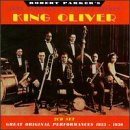| All Artists: King Oliver Title: Great Original Performances 1923-30 Members Wishing: 1 Total Copies: 0 Label: Louisiana Red Hot Original Release Date: 4/27/1998 Re-Release Date: 5/19/1998 Genres: Jazz, Pop Styles: New Orleans Jazz, Traditional Jazz & Ragtime Number of Discs: 2 SwapaCD Credits: 2 UPC: 608691060725 |
Search - King Oliver :: Great Original Performances 1923-30
 | King Oliver Great Original Performances 1923-30 Genres: Jazz, Pop
|
Larger Image |
CD Details |
CD ReviewsNew sound for this 1920s supergroup 12/25/1999 (4 out of 5 stars) "The consistently best sound on 1920s-1930s jazz reissues is the Decca Jazz label. I find no King Oliver CDs appear under this label, though. Robert Parker achieves remarkable, though arguable, sonic results with his "Digital Stereo" on this 2CD set. The higher frequencies have not been amputated with low-pass filters (as is the case with the French RCA reissue "King Oliver and his orchestra 1929-1930"). But the stereo effect seems mostly due to the addition of reverb, and the band sounds like it is playing in a large and empty concert hall, a dubious psychoacoustic achievement. The processing also introduces ear-chewing resonances in the upper register overtones of the horns. The Jazz Chronological Classics series has reissued his recordings, but based on the sound quality of one sample I have heard from that series, I would avoid them entirely. As to the music, this was one of the Jazz supergroups of the 1920s, and they continuously provide moving musical surprises from their magic hat of riffs, rhythms, solos, melodies, and musical realms." For those of us who are King Oliver cultists bukhtan | Chicago, Illinois, USA | 10/24/2003 (4 out of 5 stars) ""How horrible to have lived in the 20th century and never to have heard King Oliver", as the fine English poet Philip Larkin said, quoted in the excellent liner notes to the great Australian re-masterer Robert Parker's 2-CD collection of Kingoliveriana. King Oliver fascinates jazz fans, I think, because he comes somewhere between Buddy Bolden, who never recorded and whose sound therefore can only be imagined (see the book "In search of Buddy Bolden" by Donald Marquis)and the stupendous youngster Louis Armstrong, whose genius is very nearly fully attested, and in fine sound, thanks to the Okeh label (and John R.T. Davies' superlative remastering of those 78's in his 4-CD set on the JSP label "Hot Fives and Hot Sevens"). King Oliver seems to have reached his artistic height sometime before he first recorded in Chicago in 1923. These first recordings are among the first of authentic African American jazz ensemble, with sound tolerable only to those of us who are accustomed to very old records. Unfortunately, as recording technology improved, Joe Oliver's chops wobbled, and his breath weakened. Was he really the King? Yes, and we have the sonic evidence to prove it. But it is proof by combination, conclusion, sympathy, and imagination. Robert Parker does his usual job of finding the best preserved 78's, judicious use of noise reduction and other tricks, and addition of reverb to produce a surprising presence and oomph from archival recordings. The early tracks definitely outclass the sound of the Jazz Heritage and GRP (i.e. Decca) recordings I have. It's easy to imagine being a kid just arrived in Chicago from Nebraska or Mississippi, braving your way into a Rush Street or Bronzeville dive, and hearing and seeing these great musicians shaking the walls and cutting every cheap dance orchestra to shreds, and above the pack the magisterial presence of King Oliver. My criticism of this package would be the inclusion, in the second disc, of some sides where Joe Oliver may not have played (at least one where he definitely did not) and some sides that are really nothing more than generic late New Orleans style stomps. I would, I say, criticise Parker's collection for this reason if I were not also a member of the King Oliver cult, who appreciates every piece of evidence which helps us to establish the nature of this great artist in his setting. How horrible that Joe Oliver's fall is so much better documented than his rise." Excellent Reissue of Classic Performances wtb4 | walnut Creek, CA United States | 12/07/2001 (5 out of 5 stars) "Robert Parker's audio restoration of these great recordings is wonderful. Some may find the sound overly resonant or boomy, but I didn't have this problem with this CD and I find myself playing it often. This collection includes a selection of nine performances from Oliver's classic 1923 session with Louis Armstrong - some of the most famous performances in all of recorded jazz - and the remainder of the collection is from subsequent incarcations of King Oliver's band. There's a famous duet with Jelly Roll Morton, and a great many late 1920s recordings of Oliver's larger recording ensemble, which was obviously struggling to find its style at the dawn of the swing era. Sadly, Oliver's chops deteriorated over the last half of the decade, so his solos on these later records (which comprise the bulk of this 2-CD set) are not as commanding as his magisterial performances on the 1923 sessions. However, among these later recordings, there are many top-notch tracks, including more than a few classics (such as the famous "Wa Wa Wa" which features Oliver as his best). To the end, Oliver preserved his deep, rich tone, and there a sense of sad dignity which can be heard in all of his playing. In summary: because this is King Oliver, and because it sounds so good, I give it 5 stars. But my first recommendation would be King Oliver: the Complete Set, which includes *all* of the 1923 session on 2 discs, also in excellent sound. That said, I wouldn't do without either of these reissues."
|

 Track Listings (21) - Disc #1
Track Listings (21) - Disc #1